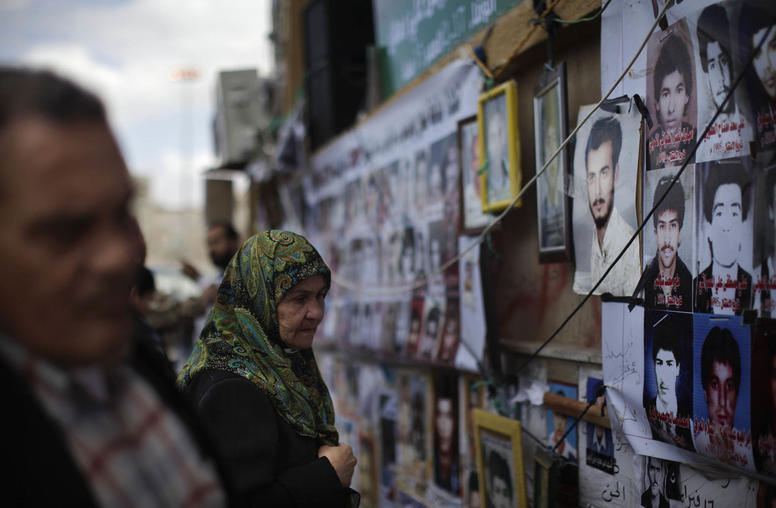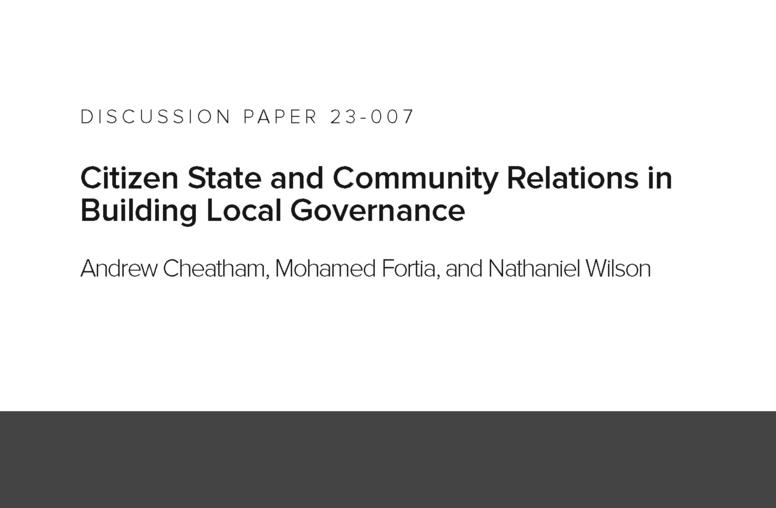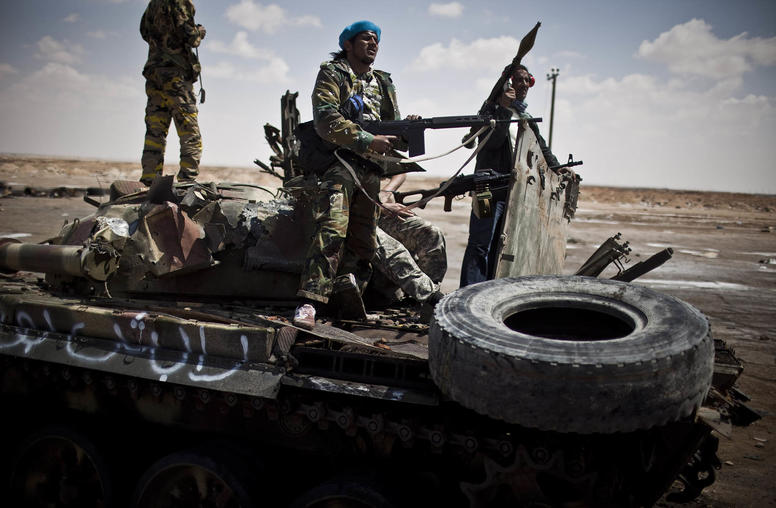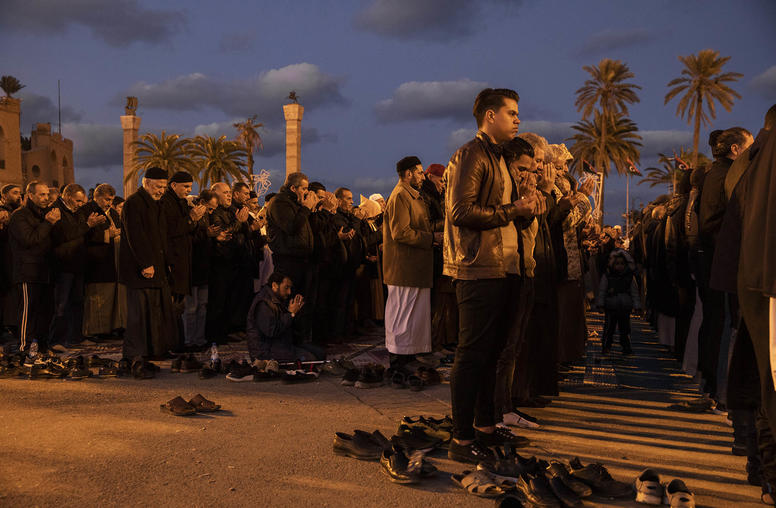Thomas Hill on Libya Peace Talks in Berlin
At the Berlin Conference last weekend, participants reached a “gentlemen’s agreement” to halt the influx of arms from international actors into Libya’s conflict. USIP’s Thomas Hill says that while “there’s probably something for both pessimists and optimists,” the lack of any formal agreement means the results are “tenuous at best.”
On Peace is a weekly podcast sponsored by USIP and Sirius XM POTUS Ch. 124. Each week, USIP experts tackle the latest foreign policy issues from around the world.
Transcript
Tim Farley: The world is trying to figure out exactly how it deals with Libya. This was ever since the death of Muammar Qaddafi and the U.S. NATO decision to take out the leader. It's been a problem and it does not seem like we are any closer to a solution. Events have been getting more complicated with different European countries backing different governments to make sense of it. And it's an important issue because it does go to U.S. security and of course the security of the region. We turn now to Thomas Hill. Thomas Hill, senior program officer for North Africa at the United States Institute of Peace. He is tweeting at @seatodca. Thomas Hill, welcome. Thank you for being here.
Thomas Hill: Thank you for having me.
Tim Farley: So, first of all, the Berlin Conference. Tell us what we need to know about that.
Thomas Hill: So, the Berlin Conference has been in the works for months. It was the U.N. and others’ attempt to bring the Germans into the discussion about Libya. The Germans had been on the sidelines. And they were perceived as the most likely broker capable of bringing the international combatants— that would be Italy, France, Russia, the UAE, Egypt, other interested parties— to the table to talk about ways that they might remove themselves from the Libyan conflict. Given that the U.S. has taken a step back from Libya, Germany was the, I guess, second choice to hold this.
Thomas Hill: It took quite a while to bring all the people together in Berlin. There were lots of starts and stops. The U.N. was a kind of silent partner to the German government in putting this together. And I think many people had very low expectations of what would happen in Germany and what would come out of it. And remains to be seen if anything that was agreed to in Berlin will hold. But there's probably something in the Berlin conference for both pessimists and optimists.
Tim Farley: It sounded like you were though saying that this gentleman's agreement that came up with if the expectations were low, they were pretty well met.
Thomas Hill: Yeah. I think a optimistic view of the conference would say, well there was a gentleman's agreement between the external actors to no longer provide arms, to disarm the militias and to abide by the terms of the U.N. arms embargo. And then they were going to set up or help support a military commission where the two main parties, the two main Libyan parties who are fighting right now, would come together to talk about ways to make the ceasefire hold long-term.
Thomas Hill: But all of this is not written down and signed and committed to by any of the parties. It is a handshake agreement. I think most people would say this is magical thinking, if the belief is that somehow this is going to translate into a stable piece going forward. This is tenuous at best.
Tim Farley: Thomas Hill, the senior program officer for North Africa, the United States Institute of Peace. There was, as you noted and have noted, some positives from this, including the fact that we saw in attendance Secretary of State Mike Pompeo and the Field Marshal Khalifa Haftar, who is one of the people who would like to be in control of Libya. The fact that they were there was good.
Tim Farley: On the other hand, you also note that there were regional states that are important in moving forward here. Tunisia, Algeria, Morocco weren't there, Egypt was there, but there seems to be an under-representation of some of the parties that would be important in making this work.
Thomas Hill: Yeah, that was a consistent criticism leading up to Berlin, was that the groups being assembled around the table were many of the bigger hitters or the more advanced countries if you think about France, Italy, etc., but that the real countries with skin in the game in terms of whether instability and Libya affects them directly, were not invited.
Thomas Hill: So as you mentioned, Tunisia, which borders Libya and has significant numbers of Libyans living in Tunisia, Algeria, same thing. They were not invited and observers were perplexed as to why you would hold a conference and not invite the neighboring states. It seems odd. More importantly, the Germans initially didn't even have the Libyans on the invite list. So that also, I think, raises a lot of eyebrows among watchers of why you would have a conference about Libya and invite no Libyans.
Thomas Hill: Now eventually, the two main figureheads of the warring factions in Libya were invited. But for many Libyans that was insufficient because the belief that this is two men or two sides fighting each other is a gross oversimplification of what's going on in Libya right now. There are many, many factions and many, many interests and many, many different groups who need to be at the table for a resolution to this conflict to be permanent.
Thomas Hill: And reducing it just to two men and two sides is I think a very myopic way of looking at this conflict, and it shows, I think, a flawed approach to how you would want to do a peace conference if you intended for that peace conference to actually work.
Tim Farley: So, Thomas Hill, you say it's kind of a win for the fact that Germany did follow through on putting this together. The U.N. did get a little bit of a nice afterglow, if you will. Just were reflective glory on this taking place, even though they didn't make this happen, but they were involved.
Tim Farley: The question is what happens now? I mean, do you look to Germany again? Do you look to the United Nations to follow through in this process? Or is the United States to get involved? What do we need to know about what next steps should take place?
Thomas Hill: So, the gentleman's agreement that came out of Berlin has now been kicked to the U.N. security council of… the expectation is that they'll turn that into a resolution, which of course has very little teeth. There are numerous U.N. resolutions saying that they should not be providing arms or weapons to groups inside Libya, and there all these resolutions are being violated and there's no repercussions for it.
Thomas Hill: So, I think that's the immediate next step. Now, my suspicion is that the Germans have no desire to enmesh themselves in the Libyan conflict any deeper than they already have and maybe this is all they'll ever do. So I wouldn't be looking to Berlin as a leader on the path to resolution of the Libyan conflict.
Thomas Hill: Maybe this kickstarts the U.N. as an honest broker in the conflict. Their reputation had been severely damaged by the inability to negotiate a ceasefire or negotiate any political movement since really 2015. So maybe this kind of invigorates that effort in the U.N. is put back in a driver's seat position to try and bring the combatants to the table. But I wouldn't hold my breath for the U.S. or any other quote-unquote "neutral party" to take over and advance the ball any further. I suspect this is a blip rather than a new trajectory.
Tim Farley: That is interesting information and of course we'll keep up to date with it. Thomas Hill, thank you for joining us on POTUS today. Thomas Hill: Thank you for having me.
Tim Farley: Thomas Hill is senior program officer for North Africa at the USIP, United States Institute of Peace. The recent Berlin Conference, what came out of it? The future of Libya still to be determined as is the case with so many global hotspots and that's one of them. The Twitter handle for Thomas, by the way, you can go to @USIP or @seatodca. There we go.



